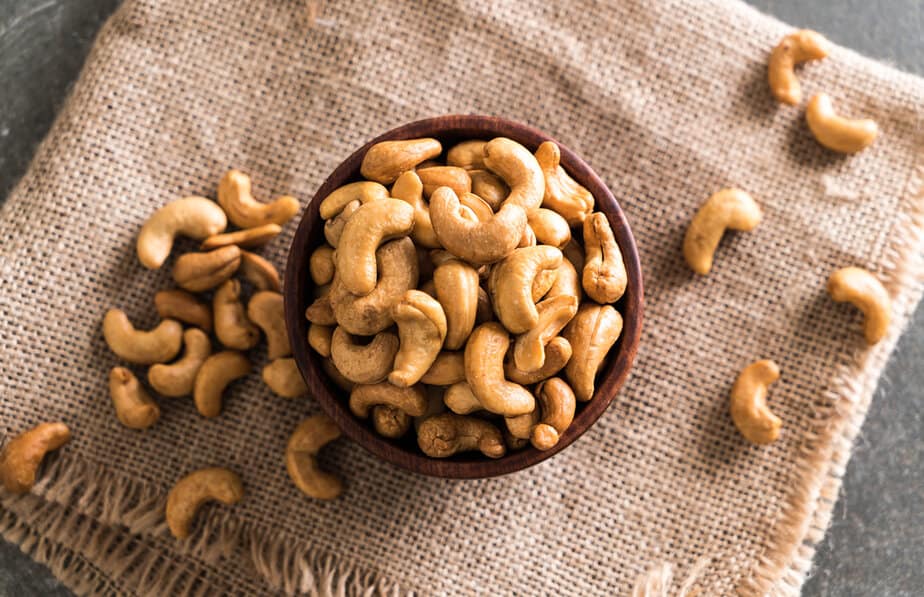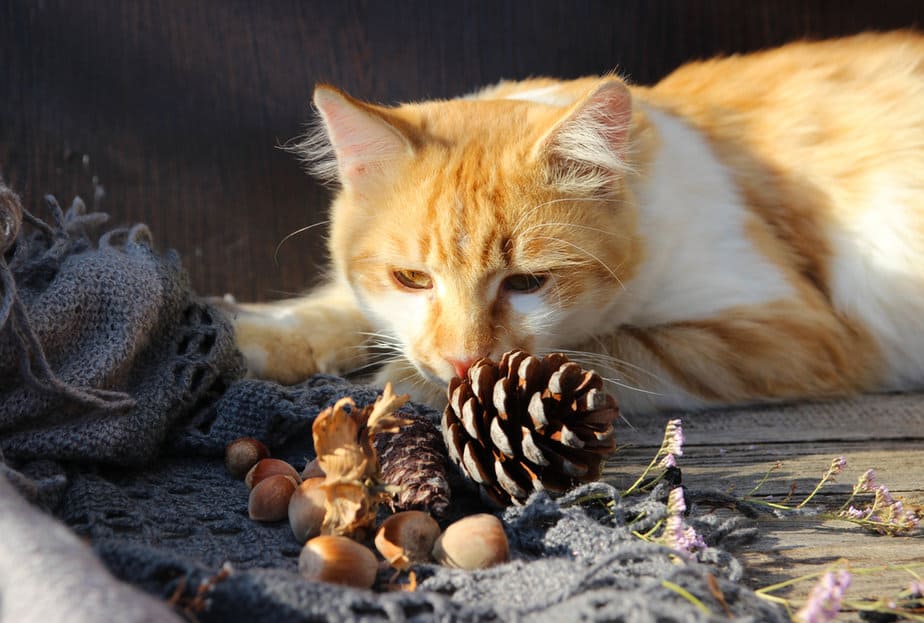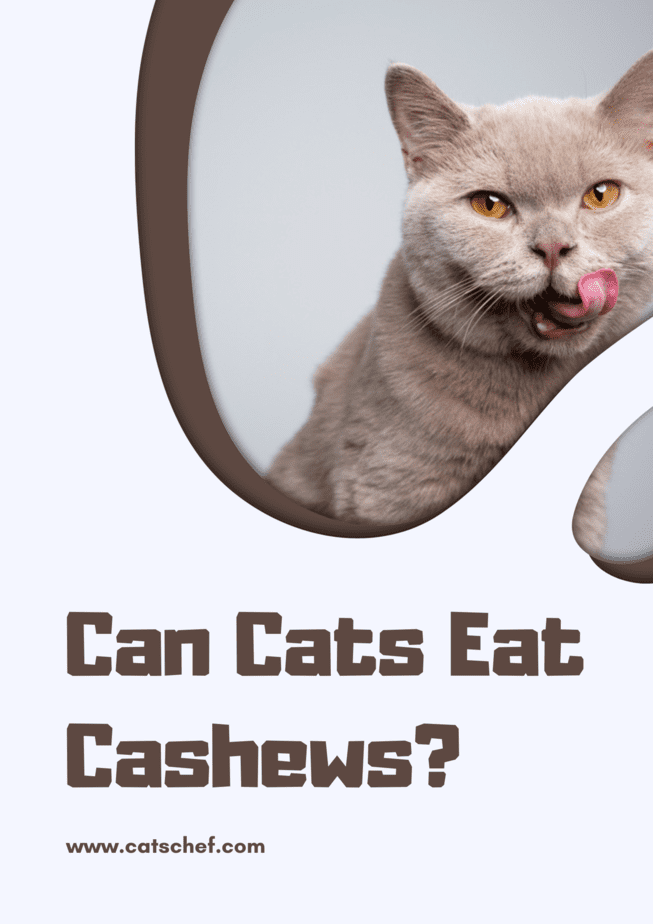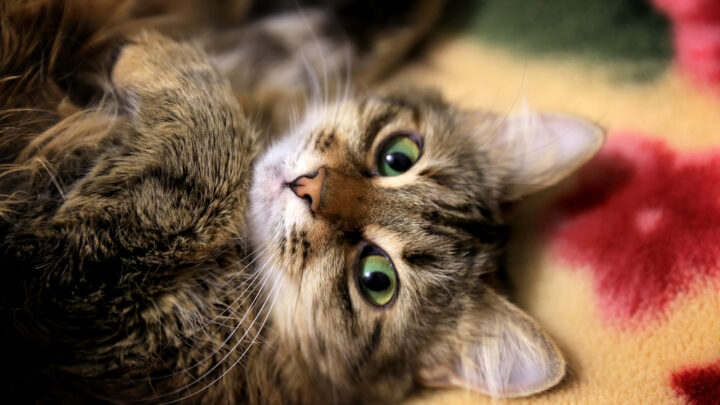If you like to munch down on these small nuts, you might think about sharing some with your cat. However, before you do, you must ask yourself can cats eat cashews?
Humans tend to assume that the healthy foods they consume are okay for their pets. In some cases, yes. But in most cases, it’s the complete opposite.
This opinion probably stems from the fact that we view our furry friends as companions. But this doesn’t mean we should feed them the foods we eat.
Cat parents have a lot going on in their minds and felines can sometimes drive you crazy. While there are many benefits of having a cat, their greediness isn’t one of them.
So, sometimes you must be on high alert and look out for any trouble your cat might’ve gotten in. This is a common occurrence in the pet world, and especially true for cats.
New worries arise with every new plan your furry friend comes up with.
Can cats eat cashews?
Cats can eat cashews, but this should be a rare occurrence. These small nuts might be attractive to your pet which is understandable – they’re simply delicious!
However, you should take note of your feline’s digestive system. They’re obligate carnivores, so nuts aren’t their main choice of food. Perhaps these can serve as a treat from time to time, but nothing more.
There are tons of cat-appropriate treats you can buy your furry friend!
The good news is that cashews aren’t toxic to cats, but this doesn’t mean they’re totally safe. There are several health benefits, but at the same time, there are certain drawbacks to these nuts.
Do cats like these nuts?

Felines are carnivores and we can’t say for sure if your pet’s going to scrunch up her nose at cashews. Still, they’re curious at the same time, so nuts just might be the ones to entice them.
If they do, she’ll likely be attracted to the fat content rather than the flavor itself. Also, if you have a spoiled cat as I do, she won’t be drawn to the idea of chewing too much.
Plant-based foods don’t usually entice their senses, but who knows. Your pet may be an odd furball wanting to dip her whiskers into anything.
While this can be a good thing, you should keep an eye out for your inquisitive pet. We know how that old saying goes and we don’t want to live through it.
What are the health benefits?
Just like any other type of nut, cashews contain a couple of health advantages that can benefit your pet as well.
Although plant material isn’t supposed to be their main choice of diet, it can serve as a nice addition. Just like certain veggies such as asparagus, cashews offer vitamins, minerals, and protein.
Protein content
The joyful news is that cashews have protein which is essential for cats. Even though it isn’t derived from meat, it can serve its purpose.
The only problem with that is that it’s possible for your pet to not digest these nuts properly. Therefore, there’s a chance she won’t fully benefit from these goods.
However, protein is crucial for felines to develop and grow up strong. It helps their bones, teeth, and various other bodily functions.
Without this health supplement, your cat is likely to fall ill very quickly. That being said, you must provide her with a chockful of protein with foods such as duck meat.
Vitamins and minerals

These small snacks have a variety of health benefits such as vitamins and minerals. All of these are important for your and your pet’s health.
Some of them include iron, B vitamins, magnesium, vitamin C, calcium, as well as vitamin D. These greatly influence your feline’s immune and overall health.
They’re involved in many body functions and help keep your pet healthy and fit. For instance, vitamin D and calcium work together to keep their bones strong, and their teeth and claws razor-sharp.
Moreover, B vitamins help transport nutrients throughout your feline’s body. They are building blocks of the cells in any organism, so they play a key role in maintaining proper energy levels. Also, they’re known for regenerating body cells.
Iron aids in regulating body temperature and regulates gastrointestinal processes. As for the body tissues, vitamin C helps their growth and development.
Magnesium helps lower blood pressure, which can help prevent several health conditions, such as kidney failure.
Can cats eat cashews all the time?
Unfortunately, this isn’t widely recommended. Although these nuts hold several health benefits to felines, they shouldn’t feast on them.
Some of the downsides to cats eating cashews are related to high fat and calorie content. Also, they’re packed with carbohydrates such as sugar and dietary fiber.
These components don’t lead to the best-case scenario for your feline. She may develop several health issues if she consumes these types of food in the long run.
That’s why one of your biggest worries when having a pet is to maintain her diet. She needs a well-balanced, meat-based diet to fulfill all of her nutritional requirements.
High fat and calorie content

Even though we might consider cats superior to us (which is true) they’re not resistant to some health issues.
If you have a pet that enjoys indulging in nuts like cashews, you should be on the lookout. These are packed with fat and some of them are saturated.
Fat is an essential nutrient in a cat’s diet and it provides them with energy and warmth. On the other hand, it can also be detrimental to your pet, especially the saturated, unhealthy fats.
They’re known to raise cholesterol levels in the blood which leads to plenty of health issues. Some of them include heart diseases, blood clotting, as well as strokes.
Can cats eat cashews because of the carbs?
When it comes to carbs, they have both the good and the bad sides. The good side would be the one that benefits your feline’s digestive system.
Dietary fiber is a carbohydrate that helps regulate functions in the gastrointestinal tract. It can help your pet with digestion and breaking down nutrients.
If your cat’s suffering from diarrhea, a bit of an additional fiber will help solve the problem. On the other hand, too much fiber can cause some problems.
It can have an adverse effect on her intestinal health. This nutrient, if consumed excessively, can be the reason for constipation and bloating. If you don’t want your furry friend letting out those lethal gases, then I suggest you cut down on the fiber!
Another carb found in cashews is sugar. While it’s found in small amounts of it, it’s still one of the drawbacks to these nuts.
Felines don’t taste and don’t crave sugar. Therefore, it’s unnecessary in their diet, and large amounts could cause trouble.
Sugar, just like fat and calories, can lead to obesity and diabetes. Moreover, if she feasts on sweet treats such as muffins, she’s more likely to develop tooth decay.
Gluten-free food!

Cashews are gluten-free by nature, which is good news. This makes them a great choice for felines or anybody who wants or needs to avoid it.
Gluten is a protein that can be found in grains, such as rye and wheat cereals. Although gluten intolerance or allergy is uncommon in cats, it can cause an upset stomach.
Symptoms include nausea, bloating, diarrhea, tiredness, and skin problems including dermatitis. Although a grain-free diet isn’t always better for your pet, if you see any of these symptoms, gluten could be the one to blame.
Cashews are a choking hazard!
If you have a gobbler, you should always be prepared for the worst-case scenarios! Not to frighten you, but cashews are a potential choking hazard.
They’re small and relatively hard. Note that felines’ teeth aren’t made for chowing down on these nuts. It’s way different than chomping down on the meat.
Just like pistachios, cashews can easily get stuck in your cat’s throat and cause panic. Cats have a harder time digesting plant material, so it might take some time until their body breaks these down.
Can cats eat processed cashews?
While we happily snack away on store-bought products like these, your pet should keep away from them. They may cause more trouble for your cat than you’d anticipate.
Unfortunately, processed foods aren’t the healthiest choice for your pet. The name is quite self-explanatory. These nuts undergo a long process before they’re ready to be presented on the shelves.
During the process, most of the food loses its nutritional value.
To make up for the flavor, store-bought foods are packed with various preservatives and additives. While they may look healthy, their appearance can be quite deceiving.
That lavish flavor is achieved primarily with salt.
Salt poisoning

If you didn’t know this already, salt is harmful to cats. You might be confused because sodium is one of the minerals that are essential to your health.
It helps regulate fluids in the body and eliminates carbon dioxide. It has many other health benefits for us, but what about felines?
In large quantities, this condiment can be detrimental to your pet’s health. In severe cases, your feline may suffer from sodium toxicity.
Sodium poisoning can have mild and more common symptoms, such as vomiting, diarrhea, as well as excessive thirst, and urination.
In other, more unfortunate cases, it can be life-threatening. Severe symptoms include seizures, tremors, and coma. If your pet’s eaten a chunk of salt, she may be at risk of dying.
Although it’s one of the most popular preservatives, it is popular in the cat world for entirely different reasons.
It can be found in many food products as it’s used for preserving freshness and flavor. Although it prolongs the product’s shelf-life, it may shorten your pet’s life.
Can cats drink cashew milk?
We all know cats love milk – wrong! This is a myth that’s been stretching on for centuries. If you offer some milk to your pet, she’s likely to gulp it down. But why?
Felines are lactose intolerant, so regular cow milk can be a problem. However, cashew milk is dairy-free which is good news.
The reason why your cat will probably indulge in it is the fat. Although the milk is processed, the fat still remains a huge part of it.
It’s creamier than other kinds of milk which makes it perfect for baking. It’s not as dense as almond butter but not as light as other nut milk.
It contains some health benefits and is lower in calories than actual cashews. So, if you want to treat your pet with some milk, this is an overall healthy option.
Nut allergies

You might be unaware of this fact, but unfortunately, cats can also be allergic to certain foods. While the most common ones are seafood like sardines, nuts are no exception.
Allergies are a defensive reaction of your immune system. It mistakes the food for something harmful and starts fighting it off.
The bad news is that you can’t really know your pet’s allergic to something until she tries it. If she ends up being allergic to cashews, she may experience the following.
Breathing problems, skin rashes, as well a stuffy nose are all symptoms of an allergic reaction. You might consider taking your pet to the vet’s office if you notice any of these after she nibbled on some nuts.
Just like edamame, cashews can be a pain in the neck.
In conclusion
So, if you wonder can cats eat cashews safely, the answer would be yes. Still, don’t get ahead of yourself and throw a bunch of these in your cat’s bowl.
They’re fine to nibble on from time to time. Other than that, they may actually become your pet’s enemy. They have several health benefits including protein, vitamins, fiber, and minerals.
On the other hand, they’re packed with fat and calories which can be detrimental to felines. Also, carbs found in cashews are unnecessary in her diet, so watch out for those.
All of these nutrients can make your cat obese which ruins the quality of her life. It can set the foundations for further complications, such as diabetes and arthritis.
On top of that, cashews are a potential choking hazard, especially if your pet’s a fast eater. If she tries gulping them down, it may call for a disaster.
If she starts showing any of the signs of an allergic reaction, it’s possible cashews are to blame. Make sure to follow up with your vet for advice afterward.

